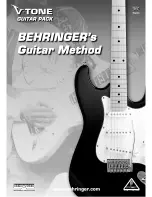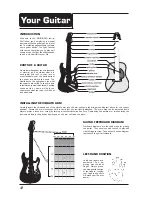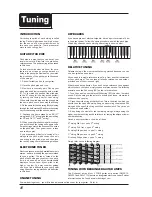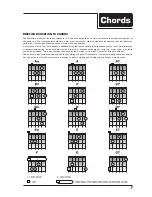
4
INTRODUCTION
Welcome to the BEHRINGER family!
Well show you how playing a musical
instrument like the guitar can be a lot of
fun. The following pages will help you learn
some guitar basics. Youll get familiar
with chords that allow you to play well-
known songs. Youll get the skills you need
to add a musical flair to your life.
PARTS OF A GUITAR
No matter what guitar you use (acoustic
or electric), and no matter what it is
used to play (folk, rock, country, jazz, or
even classical music), the basic parts of
the guitar are always the same. The
illustration to the right shows you what
these parts are called. Take some time
to familiarize yourself with those! Knowing
those parts by name will help you
understand what you read in this book
and elsewhere.
GUITAR FRETBOARD DIAGRAM
Fretboard diagrams are like road maps for playing
the guitar. They show you what notes to play and
what strings to strum. Take note of how the diagram
represents the guitar fretboard.
LEFT-HAND POSITION
Left-hand fingers are
numbered 1 to 4, be-
ginning with the index
finger. Always press
the strings with the tips
of the fingers; keeping
your fingernails short
will make your life a lot
easier.
INSTALLING THE VIBRATO ARM
Carefully insert the threaded end of the vibrato arm into the arm socket in the bridge (see diagram above for the correct
position). Rotate the arm clockwise until it is firmly (but not too tightly) attached. The arm swing can be adjusted (some
players prefer a loose arm swing) by turning it counter-clockwise one turn. Depressing the vibrato arm (while playing the
instrument) lowers the pitch and pulling up on the arm will raise the pitch.
Summary of Contents for STRAT
Page 1: ......



























